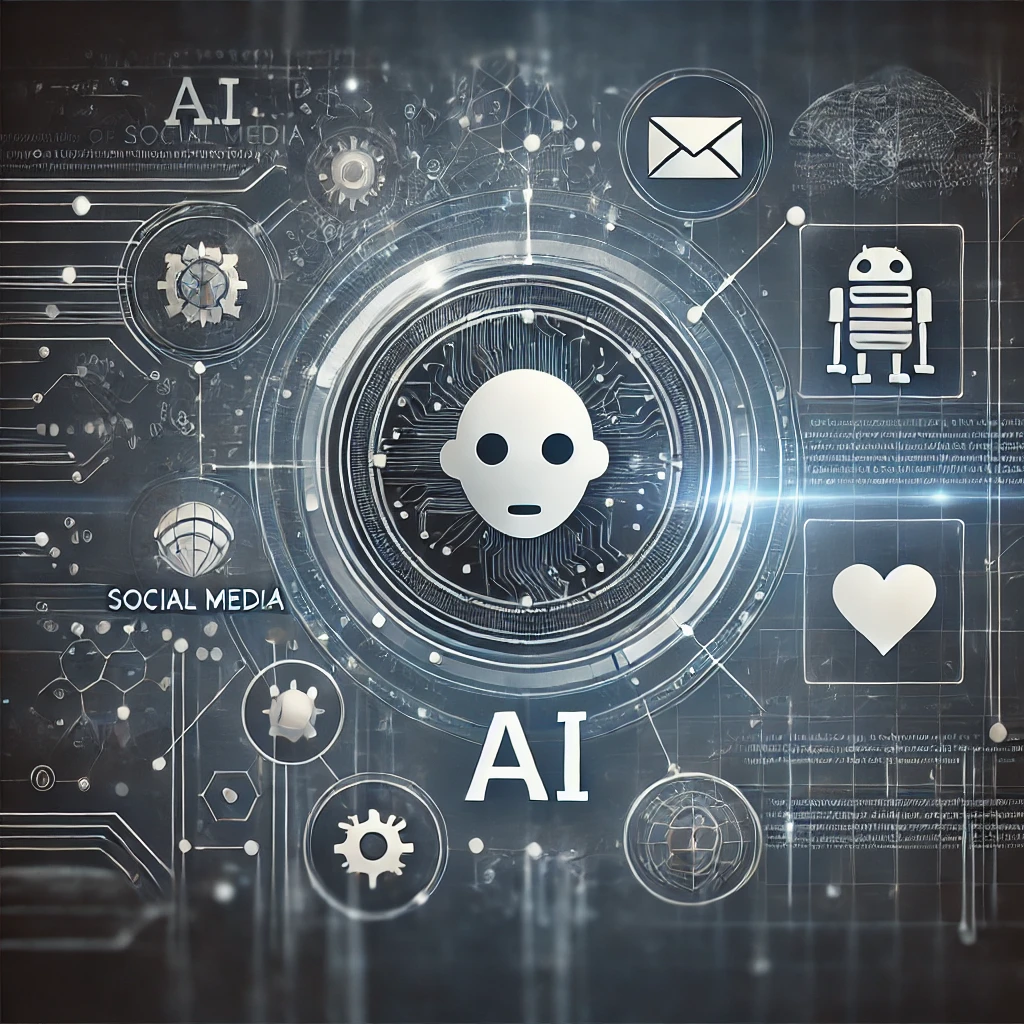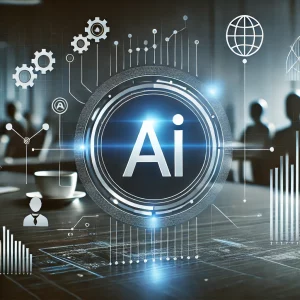Exploring the Future of Social Media with AI

Social media has become an integral part of daily life, shaping how people connect, communicate, and consume content. From Facebook and Twitter to Instagram and TikTok, these platforms have transformed social interaction, entertainment, and even commerce. However, as these platforms evolve, so does the technology that drives them. Artificial Intelligence (AI) is now playing a pivotal role in reshaping social media, enhancing user experiences, and providing new ways for businesses and creators to engage with their audiences. In this article, we explore how AI is shaping the future of social media, examining its applications, opportunities, and challenges.
1. The Growing Role of AI in Social Media
Artificial Intelligence is already deeply embedded in the architecture of social media platforms. From content recommendations and personalized ads to automated chatbots and enhanced security, AI is working behind the scenes to create more engaging and efficient social experiences. However, as AI technologies continue to advance, their potential to revolutionize social media grows exponentially.
AI’s role in social media can be categorized into several key areas:
- Personalization: AI is used to create tailored experiences for users by analyzing vast amounts of data. This allows social media platforms to recommend content, ads, and even friends based on user behavior, preferences, and interactions.
- Content Creation and Curation: AI tools are increasingly being used to assist in the creation of content, from video editing to writing assistance. Additionally, AI can curate content by identifying trends, filtering out low-quality posts, and promoting more relevant content.
- Customer Service and Engagement: AI-driven chatbots are becoming commonplace on social media, enabling businesses to provide instant support and enhance user engagement without human intervention.
- Security and Moderation: AI algorithms play a significant role in detecting harmful content, including hate speech, harassment, and misinformation, helping to maintain a safer online environment.
2. Personalization: Creating Tailored User Experiences
One of the most powerful applications of AI in social media is the ability to personalize content for individual users. Social platforms use sophisticated AI algorithms to analyze user data, such as interactions, likes, shares, comments, and search history, to create personalized experiences.
For example, Facebook’s News Feed, Instagram’s Explore page, and YouTube’s recommendation algorithm are all driven by AI. These platforms use machine learning to predict what content users will find most engaging based on their behavior patterns. The more a user interacts with content, the more refined the recommendations become.
In the future, AI could take personalization even further. For example, AI-powered systems could analyze facial expressions, voice tone, and other emotional cues to deliver more emotionally resonant content. This could enhance the user experience by ensuring that content is not only relevant but also emotionally engaging.
3. AI-Driven Content Creation and Curation
As social media evolves, the demand for fresh, engaging content has skyrocketed. AI is stepping in to assist creators and businesses in producing high-quality content efficiently.
- Automated Video Editing and Image Enhancement: Tools powered by AI, such as Adobe’s Sensei and other video editing software, are capable of automatically editing videos, enhancing images, and even suggesting improvements. AI can identify the best moments within raw footage, create highlight reels, and adjust visuals for optimal engagement based on user preferences.
- Content Writing Assistance: Platforms like Copy.ai and Jasper are using AI to assist with content generation, enabling creators to write social media posts, blogs, and product descriptions faster. These AI-powered tools use natural language processing (NLP) to understand context and tone, allowing users to create content that is both accurate and engaging.
- Trend Identification: AI can be used to analyze large datasets from various sources to identify emerging trends and topics. This allows businesses and content creators to stay ahead of the curve by producing content that is relevant to current conversations.
Moreover, AI is enhancing content curation. With the sheer volume of content being generated on social media daily, manually sorting and curating relevant posts can be a daunting task. AI algorithms, however, can efficiently filter content, ensuring that only the most pertinent and high-quality content is showcased to users, making the social media experience more enjoyable.
4. Customer Engagement and Service through AI
Another significant benefit of AI on social media is the enhancement of customer service and engagement. AI-driven chatbots and virtual assistants are already providing real-time support to users and customers on various platforms, including Facebook Messenger, WhatsApp, and Instagram.
Chatbots are powered by AI technologies such as NLP and machine learning, which enable them to understand and respond to user queries in a conversational manner. They can answer frequently asked questions, resolve issues, provide product recommendations, and even guide users through troubleshooting processes. This reduces the workload on customer service teams and ensures that users receive prompt responses at any time of day.
As AI improves, chatbots will become even more sophisticated, able to engage in more complex conversations and offer hyper-personalized responses based on individual user profiles. In the future, AI could enable truly human-like interactions, leading to enhanced customer satisfaction and deeper connections with brands.
5. AI for Enhanced Security and Content Moderation
Security is an ongoing concern in the digital age, and social media platforms are under constant scrutiny for their role in spreading harmful content such as misinformation, hate speech, and cyberbullying. AI is being deployed to help monitor and regulate content, ensuring that platforms remain safe for users.
- Content Moderation: AI-powered tools can automatically detect offensive language, hate speech, explicit content, and other harmful material in real-time. Machine learning models are trained on vast datasets to recognize patterns and context, making it possible to filter out inappropriate content before it reaches the broader community. This technology is crucial in reducing the burden on human moderators, who can often struggle to keep up with the volume of content posted daily.
- Misinformation Detection: AI is also being used to combat the spread of fake news and misinformation. AI models can analyze the credibility of sources, check facts against reputable databases, and flag content that might be misleading or false. In combination with human oversight, AI can help social media platforms reduce the impact of fake news, especially during sensitive events like elections or pandemics.
- Privacy Protection: AI is being used to protect user privacy by identifying and blocking suspicious activities or unauthorized data access. AI algorithms can also be used to help protect users’ personal data by detecting potential breaches or unauthorized sharing.
As social media platforms continue to expand globally, the role of AI in ensuring a safe and secure online environment will become even more crucial.
6. The Future of AI in Social Media: Opportunities and Challenges
The future of AI in social media holds immense potential, but it also presents several challenges.
- Opportunities:
- Hyper-Personalization: AI will continue to refine its ability to tailor experiences for individual users, improving engagement and satisfaction.
- Better Content Discovery: AI will enhance content discovery, making it easier for users to find content that resonates with them, and for brands to reach their target audiences.
- Increased Automation: As AI continues to evolve, more aspects of social media management, from content creation to customer service, will be automated, reducing costs and increasing efficiency for businesses.
- Challenges:
- Bias in AI Algorithms: AI systems are only as good as the data they are trained on. If the data is biased, it could lead to unfair outcomes, such as reinforcing stereotypes or excluding certain voices from social media platforms.
- Ethical Concerns: AI-powered personalization could raise privacy concerns, as platforms gather more data to deliver targeted content and ads. Users may feel that their personal information is being exploited without their consent.
- Job Displacement: As AI takes over more tasks traditionally performed by humans, there are concerns about job displacement in industries related to content moderation, marketing, and customer service.
7. Conclusion
AI is set to play a transformative role in the future of social media, offering new ways to engage users, create content, and ensure security. From hyper-personalized experiences and AI-driven content creation to enhanced moderation and real-time customer service, AI is poised to reshape the social media landscape. However, as with any emerging technology, the implementation of AI in social media must be approached with caution, ensuring that ethical considerations, user privacy, and fairness are prioritized.
As AI continues to evolve, the future of social media will be more intelligent, personalized, and efficient, but it will require careful management to ensure that it benefits both users and businesses in a responsible manner.





